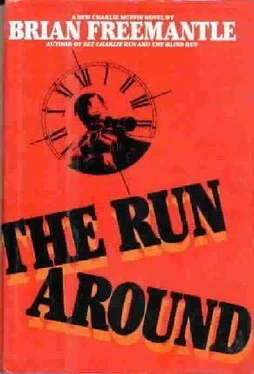Brian Freemantle - The Run Around
Здесь есть возможность читать онлайн «Brian Freemantle - The Run Around» весь текст электронной книги совершенно бесплатно (целиком полную версию без сокращений). В некоторых случаях можно слушать аудио, скачать через торрент в формате fb2 и присутствует краткое содержание. Жанр: Шпионский детектив, на английском языке. Описание произведения, (предисловие) а так же отзывы посетителей доступны на портале библиотеки ЛибКат.
- Название:The Run Around
- Автор:
- Жанр:
- Год:неизвестен
- ISBN:нет данных
- Рейтинг книги:3 / 5. Голосов: 1
-
Избранное:Добавить в избранное
- Отзывы:
-
Ваша оценка:
- 60
- 1
- 2
- 3
- 4
- 5
The Run Around: краткое содержание, описание и аннотация
Предлагаем к чтению аннотацию, описание, краткое содержание или предисловие (зависит от того, что написал сам автор книги «The Run Around»). Если вы не нашли необходимую информацию о книге — напишите в комментариях, мы постараемся отыскать её.
The Run Around — читать онлайн бесплатно полную книгу (весь текст) целиком
Ниже представлен текст книги, разбитый по страницам. Система сохранения места последней прочитанной страницы, позволяет с удобством читать онлайн бесплатно книгу «The Run Around», без необходимости каждый раз заново искать на чём Вы остановились. Поставьте закладку, и сможете в любой момент перейти на страницу, на которой закончили чтение.
Интервал:
Закладка:
‘The sealed room and the container?’ reminded Zenin.
Lyudin led the way further back into the rezidentura , to a chamber actually within the building, with no connection to any outside surface. It was so small Zenin was practically able to reach out sideways and touch either wall. There was harsh strip lighting around the four sides of the squared ceiling and it illuminated the entire area in a glare so fierce that Zenin had to squint against it.
‘This is the examination room: we were advised you would need to conduct an examination,’ said Lyudin.
Zenin was curious at what other things at what other times might have been examined here: despite his profession he’d never been into a mortuary but imagined this must be very like such a place. There was just a metalled table, a single chair, metal again, and a wall-mounted telephone: there was even a smell of antiseptic cleanliness. He said: ‘This will do adequately.’
‘The container is in my personal security vault.’
‘I would like it now.’
For a moment Zenin imagined the man was going to suggest an alternative but instead Lyudin nodded acceptance and hurried from the room. Zenin found it oppressively hot — he supposed from the intense lighting — and claustrophobic, too. Zenin decided that such surroundings would quickly disorientate a person, particularly if that person were frightened: perhaps it was fortunate he was anything but frightened. Lyudin returned almost at once. The container appeared to be of some hardened plasticized material but Zenin knew it to be stronger than that, a specialized light-weight alloy at least capable of withstanding an aircraft crash and any engulfing fire that might have followed. On the outside was a large combination lock activated only by a first-time operation of the correct selection of numerals, which only he possessed, memorized. Any wrongly probed sequence, in an effort by an expert locksmith to discover the combination, would have automatically set off the phosphorus and then acid incineration of the contents; the container was hermetically sealed so the chemical reaction of phosphorus and acid would have made a gas sufficient to create a bomb capable of destroying everybody and everything within its fifty-metre radius. In addition to the explosion, the alloy under such pressure disintegrated into thousands of razor-edged shards: its destructive capability had been tested over an additional fifty metres against gulag detainees like Barabanov, against whom Zenin had been pitted at Balashikha. There had, of course, been some survivors: twenty, each so badly maimed they were shot on the spot because they could never medically have recovered to perform any further useful function. One hundred and fifty died outright, burst apart.
‘I thought at first it was a standard container, the sort we get all the time?’ said Lyudin, enquiringly.
‘It isn’t,’ said Zenin.
‘Something unusual then?’
‘Get out, Yuri Ivanovich!’ dismissed Zenin.
Zenin locked the door behind the departing Russian and turned back to the container, savouring its very appearance like a child knowing its most asked-for Christmas toy was beneath the wrapping. But there was no excitement shake in his hand as Zenin reached out for the combination, which moved without any perceptible click as the memorized numbers were engaged and discarded: he paused when the final one was released and then snapped open the catch. The container fell apart, either side opening like a giant mouth from its bottom hinges. It was a superbly packed Christmas toy.
The inside had been machined and socketed perfectly to receive and hold every part of the dissembled rifle and each variety of its ammunition. It occupied one entire side of the container, laid out for inspection. Which was what Zenin did, counting off from another memorized list the components which made up the 7.62 mm American M21 sniper’s rifle upon which he had been so diligently trained at Balashikha. It had been reconstructed especially for him by the KGB’s Technical Division, measured to the millimetre to his arm length and shoulder dip, and modified further beyond the standard hand-constructed US model. The walnut and epoxy resin stock had been replaced by a skeleton metal rest to balance the weight of the other adjustments. The most important of these was a series of attachment clasps for the elaborate harness which went far beyond the usually fitted elbow-twist strap. The harness was again made-to-measure and of the best graded leather, once more identifiably American. It was a complete vest, the main part encompassing his body from waist to shoulders, across which went the thickest of the straps. There were four others which attached to special clasps, effectually welding the rifle to his body. The magnified sight maintained the standard design of two stadia on a horizontal graticule but because the range was beyond the designed three hundred metres there was a heavy power ring to increase the sighting distance and this had been allowed for by strengthening the mounting. There had also been another weighting allowance for the final modification. At the bottom of the rifle side of the container was a rectractable three-legged tripod upon which the weapon was to be locked by a grooved screw-nut device, which, together with the harness, made the assembly absolutely rigid. When completely tightened to fix the rifle on to the tripod the screw-nut became parallel with two-minute spring-repressing lines which compensated for the minuscule recoil. That, too, was a modification, even though the trigger pull had been taken up from its 2.15 kg to 1.15.
Zenin felt out, running his fingers at random over the sound suppressor and the primed gas cylinder and the piston, a craftsman encountering the favourite tool of his trade.
The Browning parabellum automatic was on the opposite wall of the case and assembled, except for the empty butt clip, which was fastened alongside. Again there were two varieties of bullets, the Israeli hollow-nosed in a separate holder from the solid test bullets. In this section, too, was the bradawl and screws to fasten the tripod to the floor, adjoining the sockets in which were held hard metalled screws and a screwdriver.
There was a metal bar upright in the centre of the container and from it, in separate plastic bags, were suspended the suit and shoes for Zenin to change into to alter his appearance for his departure from the embassy. At the very bottom was the duplicate bag.
Zenin stripped off the overalls, this time folding them neatly on the table beside the container, and placed the work boots next to them. The suit was intentionally light coloured, beige, to be as opposite as possible from what he had worn when he entered the embassy. When he finished dressing Zenin transferred the rifle parts and the pistol to the bag, hefting it in his hands as a reminder of the weight which he had also rehearsed carrying at Kuchino, and then put the work clothes back into the container, which he closed and resealed against its specialized interior being seen by Lyudin.
The rezident was waiting expectantly in an opposing office when Zenin opened the door. He said: ‘Was everything satisfactory?’
Zenin considered the question ridiculous and the man further incompetent for not making the demand he should have done. He said: ‘What else could it have been?’
‘That drink now?’
It was still almost an hour before the lunch-hour when more people than usual were arranged to make the exodus in which Zenin planned to be concealed. He said: ‘Why not?’
Lyudin led the way to a more spacious office further along the corridor furnished with chairs and a couch. The bottles were set out upon a tray on top of a wall-bordering cupboard. The man splashed neat vodka into two tumblers, offered one to Zenin and made an arm-outstretched toast. ‘Russia!’ he declared and sank the drink Soviet fashion, in one gulp.
Читать дальшеИнтервал:
Закладка:
Похожие книги на «The Run Around»
Представляем Вашему вниманию похожие книги на «The Run Around» списком для выбора. Мы отобрали схожую по названию и смыслу литературу в надежде предоставить читателям больше вариантов отыскать новые, интересные, ещё непрочитанные произведения.
Обсуждение, отзывы о книге «The Run Around» и просто собственные мнения читателей. Оставьте ваши комментарии, напишите, что Вы думаете о произведении, его смысле или главных героях. Укажите что конкретно понравилось, а что нет, и почему Вы так считаете.












